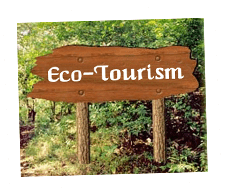Eco-tour
Courtesy :
Eco-tourism focuses on local cultures, wilderness adventures, volunteering, personal growth and learning new ways to live on our vulnerable planet. It is typically defined as travel to destinations where the flora, fauna, and cultural heritage are the primary attractions. Responsible ecotourism includes programs that minimize the adverse effects of traditional tourism on the natural environment, and enhance the cultural integrity of local people. Therefore, in addition to evaluating environmental and cultural factors, initiatives by hospitality providers to promote recycling, energy efficiency, water re-use, and the creation of economic opportunities for local communities are an integral part of ecotourism.
Historical, biological and cultural conservation, preservation, sustainable development etc. are some of the fields closely related to Eco-Tourism. Many professionals have been involved in formulating and developing eco-tourism policies. They come from the fields of Geographic Information Systems, Wildlife Management, Wildlife Photography, Marine Biology and Oceanography, National and State Park Management, Environmental Sciences, Women in Development, Historians and Archaeologists, etc.
Ecotourism is considered the fastest growing market in the tourism industry, according to the World Tourism Organization with an annual growth rate of 5% worldwide and representing 6% of the world gross domestic product, 11.4% of all consumer spending – not a market to be taken lightly
Some definitions, views, statements and objectives –
Tourism is changing rapidly as nature, heritage, and recreational destinations become more important, and as conventional tourism is forced to meet tougher environmental requirements. This presents a challenge to government and private enterprise to develop new approaches to the tourism market. Successful tourism must benefit local populations economically and culturally to give them incentives to protect the natural resources which create the attraction. Strategies must be economically feasible if private investors are to support the projects.
Our goal is to enable people to enjoy and learn about the natural, historical and cultural characteristics of unique environments while preserving the integrity of those sites and stimulating the economic development opportunities in local communities.
Specifically, we believe that successful ecotourism projects must:
- effectively promote the preservation of entire local ecosystems, not just individual species, vistas or sites;
- be economically viable in order to attract financing and be sustainable:
- be well planned, financed, managed and marketed in order to meet the stringent environmental and recreational demands of a true ecotourism development.
Eco-Tourism International
Ecotourism is cultural tourism (a cross-cultural experience), nature tourism (assisting with conservation programmes), a travel-learn experience (discover how we are coping with modernity), a little bit of soft adventure (just being here is an adventure), and benefiting the well-being of indigenous peoples.
Western Samoa, National Ecotourism Programme
Around the globe, eco-tourism is quickly becoming one of the most popular forms of vacationing.
In an era of heightened environmental consciousness and accessibility to exotic locales, countries are busily promoting their natural resources as lures for tourists. The trick with ecotourism is to preserve the natural resources while also promoting them and accommodating volumes of tourists.
Businesses are creating camps and eco-lodges, and natural resource managers are designing trails and tours. Most of the popular eco-travel destinations have fragile eco-systems, however, so it is important to maintain a careful balance between preservation and promotion — “sustainable development” — in order to ensure the long-term health of both the eco-systems and the tourism economies.
Science and the Environment
Tourism Concern advocates
- Tourism that is just, yielding benefits that are fairly distributed.
- Tourism that is participatory, recognising the rights of residents.
- Tourism that is sustainable
Tourism Concern
The term ecotourism was coined by Héctor Ceballos-Lascuràin in 1983, and was initially used to describe nature-based travel to relatively undisturbed areas with an emphasis on education. The concept has, however, developed to a scientifically based approach to the planning, management and development of sustainable tourism products and activities.
It is an enlightening, participatory travel experience to environments, both natural and cultural, that ensures the sustainable use, at an appropriate level, of environmental resources and, whilst producing viable economic opportunities for the tourism industry and host communities, makes the use of these resources through conservation beneficial to all tourism role players.
It is not a marketing ploy, nor is it scenic or nature-based travel
It is an approach that creates a variety of quality tourism products that are:
- environmentally/ ecologically sustainable
- economically viable
- socially and psychologically acceptable
The result of which reflects:
- an integrated and holistic approach to product development
- capacity building in host communities
- a sense and uniqueness of place
- commitment to the greening of the tourism industry



